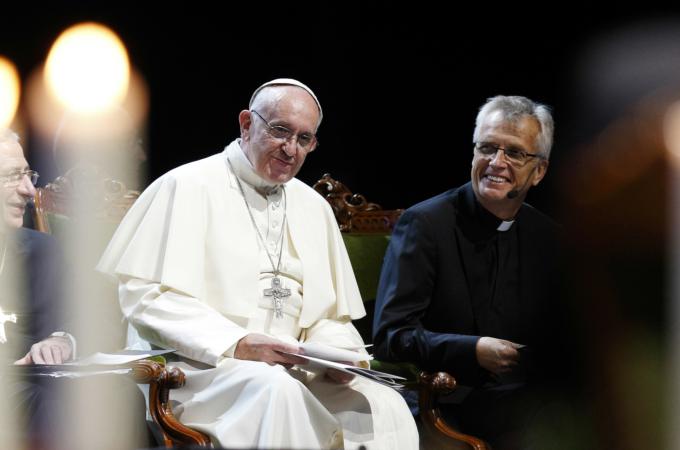From Conflict to Communion
We are just a month away from the fall season in which the 500th anniversary of the Protestant Reformation will be commemorated on Oct. 31. Each earlier centenary commemoration has been shaped by church and political agendas that reflected the cultural and political context of the time.
In 1617, for example, the first observance of the 100th anniversary of Martin Luther's posting of the 95 theses helped to stabilize and revitalize the common Reformation identity of Lutherans and Reformed at their joint commemorations. Lutherans and Reformed (followers of John Calvin) demonstrated their solidarity through strong polemics against the Roman Catholic Church. And three centuries later, in 1917 amidst the First World War, Luther was portrayed as a German national hero.
Like earlier centenary commemorations, the year 2017 will have its own unique context as well. It will mark 50 years of Lutheran-Roman Catholic dialogue and thus be the first commemoration of the Reformation taking place in an ecumenical age in which Lutherans and Catholics have been able to reinterpret their theological traditions and practices, recognizing the influences they have had on each other.
Because past commemorations were mostly oppositional, they often intensified the conflict between the churches and even at times led to open hostility.
In the mid-16th century, the context was one of hardening mutual alienation. At the end of the 20th century, by contrast, it was one of increasing mutual rapprochement, powerfully aided by an ecumenically committed pope and a Lutheran commitment to wide-ranging ecumenical dialogue, not only with Catholics but also with Anglicans, Reformed, and Methodists.
In our time, the international Lutheran-Roman Catholic Commission on Unity has produced its latest report, titled: "From Conflict to Communion: Lutheran-Catholic Common Commemoration of the Reformation in 2017." The intertwining of these two anniversaries -- that of the Reformation and that of the dialogue commission's healing work -- appropriately invites us to plan some joint events. This is the first centenary commemoration of the Reformation marked by a real desire on both sides to come together for its observance. And toward that end, some excellent materials have been provided for our reading, discussion, and prayer.
For reading is the International Lutheran-Roman Catholic Commission on Unity's latest report "From Conflict to Communion." It is the first attempt by both dialogue partners to describe together at an international level the history of the Reformation and its intentions.
As the commission says in the foreword, "the text describes a way 'from conflict to communion' -- a way whose goal we have not yet reached.... We invite all Christians to study the report of our Commission both open-mindedly and critically, and to come with us along the way to a deeper communion of all Christians."
To promote study and discussion, "A Study Guide: From Conflict to Communion" has been written by a committee of the Diocese of Pittsburgh and the Diocese of Greensburg, the Byzantine Catholic Eparchy of Pittsburgh, and the Southwestern Pennsylvania Synod of the Evangelical Lutheran Church of America.
The study guide is designed to increase mutual understanding between Catholics, Lutherans, and other Christians. It is a catalyst for healing and reconciliation both communally and individually. "The goal of our mutual commemoration," writes the committee, "must include remembering our history and continuing our movement toward the unity that Christ wills for his followers." It is distributed by the U.S. Conference of Catholic Bishops in booklet form and is also available online.
For prayer together, the Lutheran World Federation and the Pontifical Council for Promoting Christian Unity, in cooperation with a group of noted theologians, have jointly developed a communal liturgical guide entitled "Common Prayer: Lutheran-Catholic Common Commemoration of the Reformation in 2017."
Based on the study report "From Conflict to Communion," the prayer booklet is structured around the themes of thanksgiving, repentance, and commitment to common witness. It includes materials that can be adapted to local liturgical and musical traditions of churches in the two Christian traditions. The booklet stresses the shared beliefs between Roman Catholicism's 1.2 billion members and the 75 million Lutherans around the world. It suggests that the ecumenical services have two presiders, one Catholic and one Lutheran, with readers from both churches.
What will congregations in your area do as this noteworthy anniversary approaches? The resources are literally available-to-hand. One can find and download all three of these resources by simply going online and typing in: From Conflict to Communion.
- Father Thomas Ryan, CSP, directs the Paulist North American Office for Ecumenical and Interfaith Relations in Boston.



















